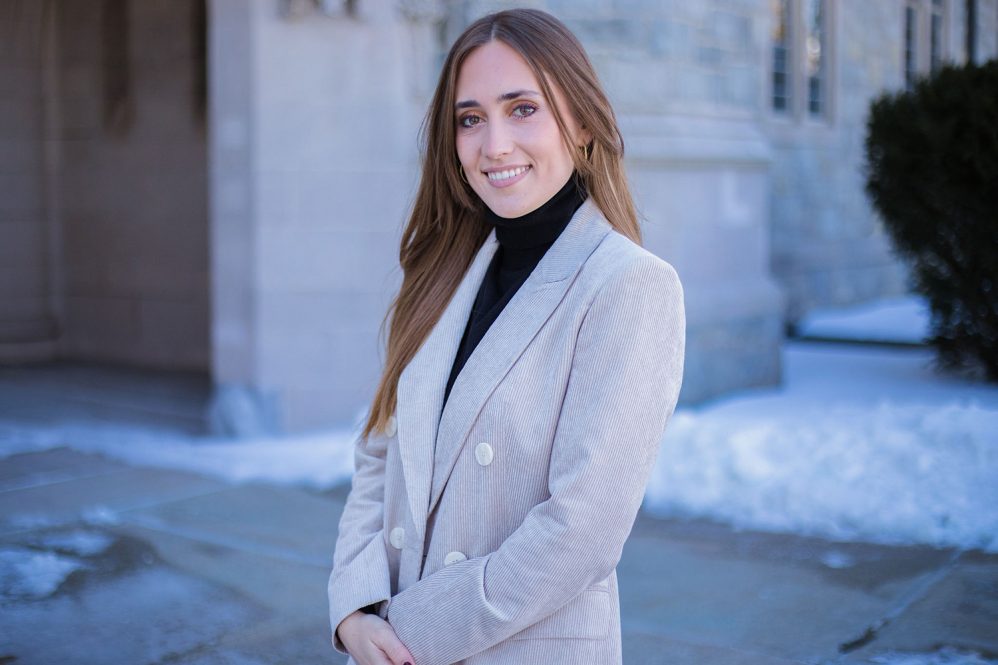Andréa Nunes ’22 JD had a path mapped out when she enrolled at the UConn School of Law. She wanted to participate in the Asylum and Human Rights Clinic to prepare for a career in immigration law.
“My decision to go to UConn was definitely very much influenced by the fact that it has an asylum clinic that has such a great reputation,” she says. The clinic was a highlight of her law school experience, which she credits with teaching her not only about the law but about how to work as part of a legal team.
By the time she graduated in May 2022, Nunes had been accepted as a justice fellow with the Immigrant Justice Corps. The prestigious two-year fellowship will start in September and will support her work with Lutheran Social Services of New York, where she will represent individuals applying for asylum and children applying for special immigrant juvenile status.
Nunes grew up in Farmington, in a family with a strong immigrant identity. Many members of her father’s family came to the United States from the Portuguese island of Madeira, and her life has always been full of their language and culture.
After she graduated from Lesley University in Cambridge, Massachusetts, in 2015, Nunes worked with AmeriCorps for a year at a community health center in New Jersey. Her experience involved outreach among migrant farm workers, most from Latin America, who were working in difficult conditions.
That experience and others impressed on her how much more complicated and restricted immigration had become since her relatives came to the United States. “The very difficult nature of immigration today extends beyond just trying to forge a new life and create new community and find peace in a new place,” she says.
While AmeriCorps developed her passion for working with migrants, she didn’t yet imagine doing it as a lawyer. She returned to school to earn an MA in Refugee and Forced Migration Studies from DePaul University in Chicago. While studying at DePaul, she volunteered as an observer with a court watch program, taking notes and offering non-legal support to migrants in Immigration Court.
It was there she saw over and over again how migrants without lawyers fare much worse than those who have legal representation. The idea of attending law school began to grow.
“I think there are a lot of ways to advocate for justice and for immigrant rights in particular,” she says. “But I felt like legal advocacy was one of the most effective ways because I realized having quality legal representation makes a really big difference. People being sent back to their countries where they face persecution, it’s a life-or-death matter.”
After earning the master’s degree, Nunes worked with asylum-seekers as a paralegal with a private immigration attorney and then at a nonprofit agency with immigrant survivors of domestic abuse and sexual violence.
“After working for four months, I was like ‘OK, I’m going to go to law school. I can do this,’” she says.
When she reached her second year at UConn Law, she enrolled in the Asylum and Human Rights Clinic. She and her classmate, Allison Post, working under the supervision of Teaching Fellow Valeria Gomez, represented a family from the Democratic Republic of Congo. Nunes said she will never forget the phone call they made to tell a member of the family that they had won a grant of asylum.
“He was screaming with joy,” she says. “We all had goosebumps.”
Her clinic experience was entirely online because it occurred during the first phases of the COVID pandemic, but Nunes said Gomez and the clinic’s director, Professor Jon Bauer, made sure that students felt connected to their clients and to each other. She also credits Don Bell, assistant director of UConn Law’s Center for Career Development, with steering her toward the fellowship and even conducting a mock practice interview with her.
When the fellowship ends, she says, she intends to continue down the path she laid out even before she entered law school. “My long-term goal is to provide legal services at a nonprofit in the Connecticut area to immigrants applying for humanitarian visas.”
Bauer is not surprised by Nunes’ plans, given her work for the clinic. “Andréa, like her student partner Allison, showed immense dedication and superb legal skills in handling a complicated asylum case from start to finish,” he says. “She is a caring, reflective and accomplished legal advocate, and I’m proud that the clinic and UConn Law were able to help her launch her career as a public interest lawyer.”



